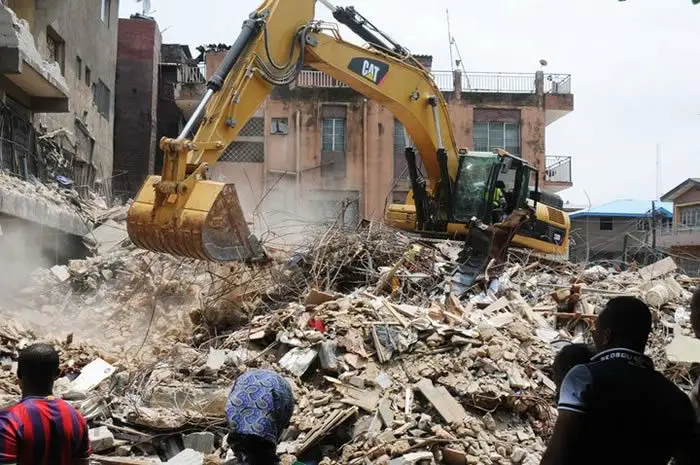A four-storey building under construction has collapsed in the commercial city of Onitisha, Nigeria killing 15 people and injuring scores of others. The victims were mainly labourers who were putting finishing touches to the building. The high number of deaths has been attributed to late arrival of heavy equipment for the evacuation of the rubbles to save some of the trapped victims.
It is alleged that use of poor quality and sub-standard construction materials is the cause of the collapse of the building which was nearing completion along St. Christopher’s Anglican Church by Old Cemetery Road, Onitsha. The ill-fated building was being constructed by the Diocese of Niger to serve as classroom blocks for pupils of St Christopher’s Primary School.
When it comes to the frequency of building collapses in Africa, Nigeria takes the lead. Various arguments have been given as to the causes of building collapses from laxity in implementation of building by-laws, usage of sub-standard building materials to lack of capacity among professionals among many others. Nigeria’s coalition of civil society groups has expressed grave concern over the frequency of building collapses and inspectors have even attributed the collapses to poor quality cement.
There have been calls on the Federal Government to bar the use of 32.5 grade cement which many attribute to the reason of building collapses. Recently, the Standards Organisation of Nigeria (SON) announced a new policy on cement which restricts the use of the 32.5 grade cement and urged manufacturers to begin production of the high-grade 42.5grade.
However, major cement manufactures in the country have vehemently denied the allegations with the association of cement producers comprising, Lafarge Cement, Wapco, Ashaka Cement, Northern Cement Company of Nigeria and United Cement Company Plc, arguing that attention should rather be on the need to improve construction practices.
Nigeria’s Lafarge Cement points out that the increasing incidents of building collapses in Nigeria are as a result of structural designs and poor usage of building materials by project handlers.
Dangote Cement Plc insists that it adheres to global best practices of cement production of a minimum of 42.5 grade cement through and above all their factories nationwide. The cement giant says those companies arguing that migrating from 32.5 to 42.5 would erode their profit margins are insincere and selfish as human lives are more important than profits.
In the past, the cement manufacturers have also had the backing from the Council for the Regulation of Engineering in Nigeria (COREN) president, Ali Kazeem who notes that sub-standard cement is not the cause of building collapses adding that cement manufacturers in Nigeria have adhered to high safety standards. He attributes the rampant collapse of buildings to influential building owners who always go scot-free since COREN does not have the power to arrest and prosecute them.
Experts have observed that the incidences of building collapse in Nigeria have become rampant in the last 10 years, incidentally at a time when more qualified professionals abound in the country.The big question that lingers now is; what needs to be done to ensure there are no more building collapses.
In our February 2014 issue, we engaged construction industry experts on why there have been frequent cases of building collapses in Africa and on how to curb this recurring- spate that is claiming lives every time it happens.

Leave a Reply